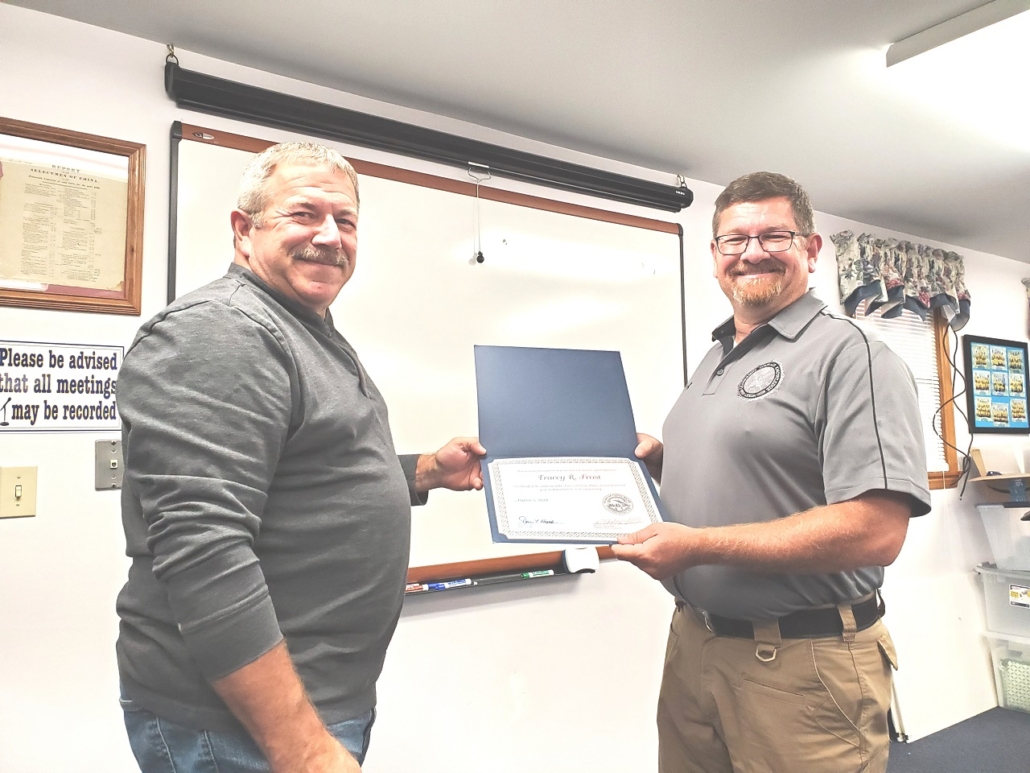China TIF members get preview of potential requests
 by Mary Grow
by Mary Grow
China Tax Increment Financing (TIF) Committee members got a preview of potential requests for TIF funds for the 2020-2021 fiscal year. After additional presentations, committee members will make funding recommendations to the selectmen, who will in turn submit requests they approve to voters at the spring 2020 town business meeting.
Scott Pierz, president of the China Lake Association and the China Region Lakes Alliance, summarized both groups’ major projects, including the LakeSmart program that helps shorefront property owners add buffers to limit run-off into the lake; the Youth Conservation Corps, whose members do the physical work of creating run-off controls; and the new CLGRRP (China Lake Gravel Road Rehabilitation Program), intended to repair fire roads around the lake, starting with three identified in a Kennebec Water District survey as contributing the most run-off into the lake.
Initial CLGRRP work has been put out to bid, Pierz said, with bids due this fall. The outcome of the bid process will be significant in calculating funds needed.
Pierz said volunteer Marie Michaud would like to reduce the time she spends on LakeSmart activities. Marie Michaud’s husband Tom Michaud, a TIF Committee member, said his wife would continue to assist, but does not want the full-time job the project has become.
The lakes groups are considering contracting with a program manager, Pierz said. Much of the preliminary work – locating sites and agreeing with landowners, developing plans – can be done in the fall so the work can start the next spring.
Briefer presentations came from:
- Elaine Philbrook, discussing plans for a small building in the school forest behind China Primary School. She envisions electricity and a heat pump, porta-potties rather than a septic system – enough to provide shelter during year-round nature activities for schoolchildren and adults.
- Tod Detre, speaking for the Broadband Committee, describing plans to work with Hussey Communications to provide wireless broadband service to all China households, including those now excluded because they are low along the lake or among hills away from towers. A tentative plan calls for doubling the number of towers, from three to six, at a cost somewhere around $800,000. Town Manager and Treasurer Dennis Heath talked of asking town meeting voters to spend the money immediately from town assets and repay it from TIF funds at $80,000 a year, once the TIF program is enlarged to cover broadband as recent legislation allows.
- Tom Rumpf, president of the China Four Seasons Club, with plans to request another TIF allocation for continued work on snowmobile and four-wheeler trails on the east side of China Lake.
The other major action at the Aug. 26 meeting was unanimous endorsement of the Revolving Loan Committee’s recommendation to approve a loan to Buckshot Power Sports. This action also goes to the selectmen with a recommendation that they forward it to the Kennebec Valley Council of Governments, which helps with loan management.
Revolving Loan Committee Chairman Amy Gartley said there are no other loan applications pending.
The causeway project at the head of China Lake’s east basin was not discussed. Heath said the state Department of Environmental Protection is reviewing needed applications for further work.
The next TIF Committee meeting is scheduled for Monday evening, Sept. 23.





 Dennis Heath, China town manager, has announced that following approval by the board of selectmen, the China Town Office will have new hours beginning November 1, 2019.
Dennis Heath, China town manager, has announced that following approval by the board of selectmen, the China Town Office will have new hours beginning November 1, 2019.